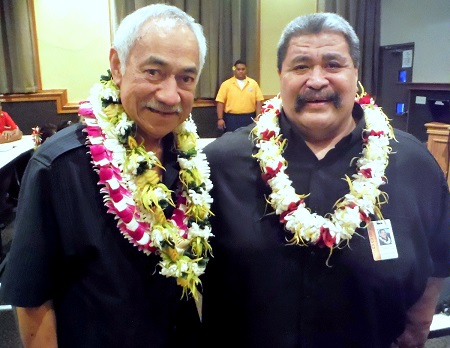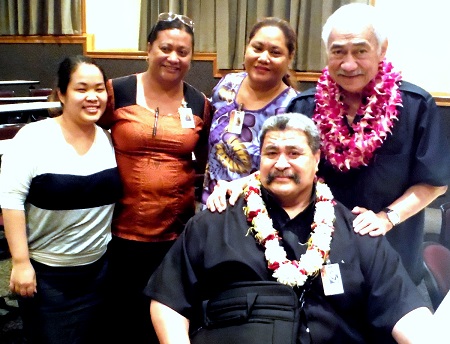
Former American Samoa Congressman Faleomavaega Eni Hunkin (left) is greeted by ASCC President Dr. Seth Galea'i prior to the former Congressman's participation in a forum on the Territory's political future which took place this past Tuesday at the College. (Photo: J. Kneubuhl)

Former American Samoa Congressman Faleomavaega Eni Hunkin (right, standing) visits with ASCC President Dr. Seth Galea'i (seated) and (standing l-r) instructor Miss Rosie Ah Chee, Dean of Academic Affairs Mrs. Letupu Moananu and Social Science chairperson Mrs. Toa'iva Fiame-Tago following Falemavaega's participation in a forum on the Territory's political future which took place this past Tuesday at the College. (Photo: J. Kneubuhl)

Former American Samoa Congressman Faleomavaega Eni Hunkin (left) is greeted by ASCC President Dr. Seth Galea'i prior to the former Congressman's participation in a forum on the Territory's political future which took place this past Tuesday at the College. (Photo: J. Kneubuhl)
Former Congressman Faleomavaega Speaks at ASCC
April 15, 2015
By James Kneubuhl, ASCC Press Officer
This past Tuesday, April 14th, former Congressman Faleomavaega Eni Hunkin accepted an invitation from the American Samoa Community College (ASCC) Social Science Department to participate in a forum on the subject of American Samoa’s political status. Before a standing room only audience in the Lecture Hall, the former Congressman discussed at length his experiences during his long years of service as American Samoa’s representative in Washington, and his views on the Territory’s relationship with the United States.
The forum audience included ASCC President Dr. Seth Galea’i, Dean and Director of Community and Natural Resources Tapaau Dr. Dan Aga, Dean of Academic Affairs Mrs. Letupu Moananu, and other ASCC faculty and administrators, along with students, including representatives of the Student Government Association and PTK Honor Society, and members of the community. Department of Education Director and Ex-Officio Board of Higher Education member Vaitinasa Dr. Salu Hunkin Finau also attended, along with members of ASG agencies and the former Congressman’s own family and staff.
Following introductions from Mr. Evile Feleti of the Samoan Studies Department and the former Congressman’s niece Miss Rachel Jefferson, Eni began with a brief summary of his years on Washington and his views on American Samoa’s political affiliation with the USA. Since the publication of his book “Navigating the Future: A Samoan Perspective on U.S.-Pacific Relations” in 1995, Eni has been urging the people of American Samoa to fully understand the nature of their official ties to the U.S. and to consider whether changes to that relationship might better serve the current and future needs of the Territory. “With all due respect to the United States,” said the former Congressman, “my concern is that if we don’t take the initiative to make our own decisions regarding our future, then these decisions will continue to be made for us from the outside.”
Keeping his initial remarks relatively brief, Eni opened the floor to questions from the audience, and spent over an hour offering his perspective on many of the political and social issues currently facing the Territory. Audience members expressed a wide range of concerns, including land issues, the composition of the Fono, immigration concerns, and the recent controversy over American Samoa’s fishing rights within our designated economic zone. The former Congressman remarked on how many current issues relate in some way to American Samoa’s political status as, in political terms, an “unorganized and unincorporated” territory of the U.S.
Eni further pointed out how it is possible for American Samoa’s status to be modified if our people make the collective choice to seek a redefined political affiliation with the U.S. As to what exactly that affiliation should be, he offered no easy solutions, and acknowledged that all of the self-determination models used by other U.S. territories have their advantages and drawbacks as applied to American Samoa’s unique circumstances and needs. Eni suggested that as a starting point, American Samoa might benefit from a carefully study of the Compact of Free Association model currently in use by the Federated States of Micronesia, the Republic of the Marshall Islands, and the Republic of Palau, all former territories that have gained a higher level of autonomy while still retaining an association with the U.S.
Near the end of the forum, an audience member asked what students could do to help the future of American Samoa. “Get your degrees,” Eni said simply, emphasizing how the better educated the Territory’s youth become, the better they will be able to negotiate the decisions they will face when the time comes for them to determine what kind of balance American Samoa strikes between its traditions and its future. With the audience questions having lasted right up till the scheduled time for the forum to conclude, Eni wished the ASCC audience well and expressed his wish to speak to them again in the future.
“As a department, we wanted to give our students the opportunity to gain a real-life experience that they can use in their future endeavors, and we hope that they were able to come away with a better understanding of the political concepts discussed in the classroom, and how it applies to their everyday lives,” said Social Science chairperson Mrs. Toa’iva Fiame-Tago. The chairperson explained that the former Congressman’s presentation aligned strongly with the Program Learning Outcomes of the Social Science Department, which include identifying and analyzing basic structures and functions of government at the national, state, and local levels; identifying and analyzing international relations theories of power, war, and peace; identifying and analyzing concepts and events in the American Samoa Government, American Government and Public Policy, International Relations, or Public Law-Political Philosophy; and developing career goals and plans for personal and professional growth.
“On behalf of the Social Science Department, we would like to thank Faleomavaega Eni Hunkin for taking the time to share his experiences as our former Congressman for 26 years,” concluded Mrs. Fiame-Tago.
